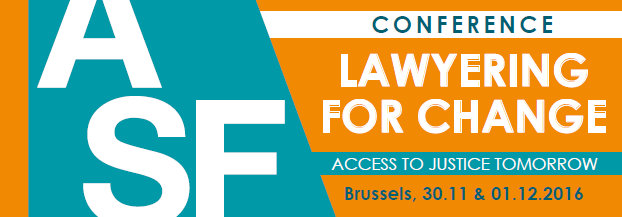 According to a United Nations estimate, four billion people do not have access to justice. In both the northern and southern hemispheres, legal assistance and representation of people with social or economic problems in accessing courts and tribunals play a key role in having their rights respected. As well as defending individual interests, the collective action of lawyers and other key players in the access to justice, such as social workers, legal experts working in the voluntary sector or community stakeholders, can also foster sustainable change within societies. Indeed, stakeholders in the access to justice are crucial in strengthening the rule of law and developing the power to act of people seeking justice. This is a key issue at a time when questions are being asked of sustainable development and the future of legal aid for vulnerable people. ASF is working in around ten fragile countries, where justice and the effectiveness of the rule of law have proved to be key elements in the social and economic development of populations, as well as crucial in preventing conflicts. Founded by ASF, the "Lawyering for Change" conference offers people the opportunity to discuss and focus on practices which foster sustainable change. Lawyers, legal experts and social stakeholders from Central Africa, South East Asia, North Africa, America and Europe will share their experiences of the work carried out in their respective countries. This experience will then be placed in the context of the recently adopted Sustainable Development Goals (SDGs) which advocate the promotion of the rule of law and the guarantee of access to justice for all. Although the "Lawyering for Change" conference is being held to discuss the projects and studies which ASF has been carrying out for a number of years on the link between the access to justice and sustainable development, the event aims above all to tackle the realities of the situations on the ground. DOWNLOAD THE PROGRAMME
According to a United Nations estimate, four billion people do not have access to justice. In both the northern and southern hemispheres, legal assistance and representation of people with social or economic problems in accessing courts and tribunals play a key role in having their rights respected. As well as defending individual interests, the collective action of lawyers and other key players in the access to justice, such as social workers, legal experts working in the voluntary sector or community stakeholders, can also foster sustainable change within societies. Indeed, stakeholders in the access to justice are crucial in strengthening the rule of law and developing the power to act of people seeking justice. This is a key issue at a time when questions are being asked of sustainable development and the future of legal aid for vulnerable people. ASF is working in around ten fragile countries, where justice and the effectiveness of the rule of law have proved to be key elements in the social and economic development of populations, as well as crucial in preventing conflicts. Founded by ASF, the "Lawyering for Change" conference offers people the opportunity to discuss and focus on practices which foster sustainable change. Lawyers, legal experts and social stakeholders from Central Africa, South East Asia, North Africa, America and Europe will share their experiences of the work carried out in their respective countries. This experience will then be placed in the context of the recently adopted Sustainable Development Goals (SDGs) which advocate the promotion of the rule of law and the guarantee of access to justice for all. Although the "Lawyering for Change" conference is being held to discuss the projects and studies which ASF has been carrying out for a number of years on the link between the access to justice and sustainable development, the event aims above all to tackle the realities of the situations on the ground. DOWNLOAD THE PROGRAMME